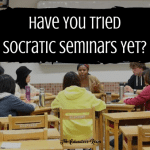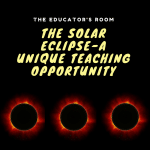With the school year beginning to wind down, I’ve been thinking of new ways to improve and update my curriculum for next year. What are some things that worked really well, and what are some things that I want to update? This got me thinking of ways to make my lessons even more hands-on and engaging for my students, which got me thinking about cross-curricular education.
Being a new teacher, there are always a lot of ideas that I want to try out in my classroom. These ideas are always a way to make my subject more accessible to my students. With English, there are lots of other subjects that I can use. I’ve tried adding things into my own lessons from art, history, and science. When I teach Shakespeare, I want to include a touch of drama, since that is the best way to learn Shakespeare. However, I am not a drama teacher. There are things that I am comfortable with, like subtext and general terms. But there are things about drama, like more specific terms, that I am learning and teaching on the fly. Maybe some cross-curricular work with the drama department could help me with this and give my students a better understanding of the play? Yes, I think it could.
Adding things from other disciplines can enhance my lessons, but like with my Shakespeare lessons, there always seems to be something missing. Now that I am a little more comfortable with my own curriculum, maybe I can reach out to coworkers. Maybe together, we can work to create something more? Something cross-curricular?
Cross-Curricular Education
The idea of cross-curricular education, or interdisciplinary education, is not a new one. For many teachers, this is a useful tool. I teach English. Students are always asking me where they’re going to use the skills that they learn in my class in real life. My response is usually something that highlights the critical thinking, reading, and writing skills that my students learn. These skills, as I tell them, will be used in every other class that they take, as well as in real life.
There are ways to use these things in my classroom. I know that. And sure, I have used archaeology in my lessons about nonfiction to make them more engaging and hands-on. I make sure to talk about the history behind a specific work. But there are times when I wonder if I could do more in working across the curriculum. Would that even be helpful to my students, or would it just be something that I would enjoy?
Research
Like I always do, I decided to investigate and see what I could find out online. Most of the sources that I found recommend using cross-curricular work. Most of these sources point out that this a great way to help stimulate the brains of students and motivate them to learn. By combining science and non-fiction, for example, the students who are more interested in science than English or history are drawn in and excited to learn.
The thing that these sources pointed out, however, was that the connections need to be real. Say I am teaching about poetry and am focusing on the Harlem Renaissance. It would be really awesome if I could coordinate with the history department, the art department, and the music department. We can all tie our lessons together in some ways while getting to step out of our wheelhouse a little bit.
The big idea, I found, is that students are learning a variety of different approaches to the same topic. Some students do not connect to poetry but can connect with music or art. The above example allows students to experience the Harlem Renaissance in a variety of ways. It helps me because the students are forming a connection, and it can help in history because students are able to put themselves in the shoes of those artists, at least a little bit.
The studies show that this method makes students more motivated and increases their learning levels. It also helps students realize that the things that they are learning are not just applicable in that specific classroom. Things learned in science can be used in English. The information from history can be applied to science. This helps students apply what they have learned in their classes. It shows them that these skills are, in fact, useful.
One of the articles I found pointed out that science, literature, and social studies are often more closely tied than we think. When I was thinking about it, I realized that there was a great to make this work! If I was to teach a unit on Frankenstein by Mary Shelley, for example, I would talk about the Romantics in literature. I would also want my students to learn about the 1800’s. I would also want to talk about science, particularly what was happening during that time. This would include the scientific method. I would also discuss the idea of more modern things like using science to manipulate the laws of nature. I would want to talk to the science department and the history department, to see if there was some way that our lessons could line up.
Final Thoughts
After looking up cross-curricular education, I was a little embarrassed that I hadn’t tried it yet. There are a ton of benefits to my students. It also served as a powerful reminder to me that my class does not have to stand alone. If I am building on the things that the middle school teaches and getting my students ready for the next grade, why am I not working with other departments to create interdisciplinary studies?
That might just be my new summer project. I’m going to see what I can do for next year with my curriculum.





